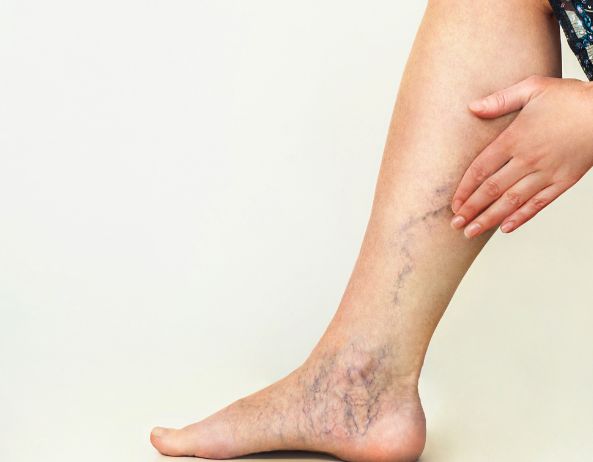Menu
- AyurVAID Pharmacy
Varicose Veins are swollen, twisted and enlarged veins, that commonly affect the legs and veins. It is common is people whose work demands long standing hours, like teachers, surgeons, cooks etc. According to Ayurveda, Varicose Veins can be correlated to a condition called Siraja Granthi, caused due to Vataprakopa or vitiation of Vata. The vitiated vata enters the Siras (veins) causing the Sampeedana (Squeezing), Sankocha (constriction), and Vishoshana (act of drying up) which produces Granthi (cyst) in the Siras (Veins). Ayurvedic Treatment for Varicose Veins often involves organic remedies, dietary adjustments, lifestyle modifications, and specific therapies aimed at improving blood circulation, strengthening vein walls, and reducing inflammation.


At Apollo AyurVAID, Varicose Veins is approached to strengthen the muscles and prevent the pooling of blood in the legs. This is achieved by a two-fold approach: External and Systemic.
Make an appointment now and treat your Varicose Veins better with Kerala Ayurveda techniques at AyurVAID hospitals.

When the condition results into painful symptoms, the patient might experience:

Bengaluru – Domlur Bengaluru – Aster CMI, Hebbal Bengaluru – HRBR Layout Bengaluru – Sri Shankara, Basavangudi Bengaluru – Bannerghatta Road Bengaluru – ArekereDelhi – New DelhiKochi – Kadavanthara Uttarakhand-Kalmatia, AlmoraChennai – Greams Road Chennai – Vanagaram Chennai – Kotturpuram Hyderabad – Somajiguda
Ayurveda Parasurgery Autoimmune Disorders Blood Disorders Cardiology Dermatology Endocrinology Ear-Nose Throat-Mouth Elder-Care Gastrointestinal Gynaecology Integrative Oncology Infectious-Diseases Liver-Hepato-Biliary-Care Mental Health and De-addiction Male-Reproductive-Disorders Nephrology Neurological-Disorders Orthopaedic Disorders Ophthalmology Obstetrics-Integrative Preventive-Health-Wellbeing Pulmonology Pediatric-Development-Disorder Sleep-Disorders
Any use of this site constitutes your agreement to the Terms and Conditions, Privacy Policy and Cancellation and Refund Policy
©2025 Apollo AyurVAID Hospitals. All rights reserved.
Popular Searches: DiseasesTreatmentsDoctorsHospitalsWhole person careRefer a patientInsurance